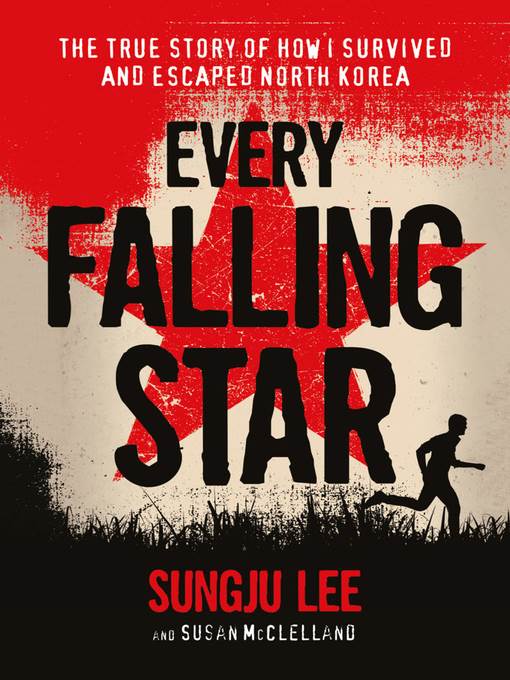
Every Falling Star
The True Story of How I Survived and Escaped North Korea
فرمت کتاب
ebook
تاریخ انتشار
2016
Lexile Score
880
Reading Level
4-5
ATOS
5.9
Interest Level
6-12(MG+)
نویسنده
Susan Elizabeth McClellandناشر
ABRAMSشابک
9781613123409
کتاب های مرتبط
- اطلاعات
- نقد و بررسی
- دیدگاه کاربران
نقد و بررسی

July 18, 2016
This affecting memoir starts slowly but gains momentum as it highlights a boy’s survival and eventual escape from North Korea. The narrative begins with a brief history of 20th-century Korea that helps establish context. Lee enjoyed a privileged childhood in Pyongyang as the son of a respected military officer until his fate changed abruptly at age 10, when his family left for an extended “holiday” in a northern sea town where his parents were forced to work as laborers. Writing with McClelland (Stars Between the Sun and Moon), Lee effectively describes his own trusting ignorance and how he began to understand the dire state of their exile. The strongest section recounts Lee’s harrowing life on the streets as he banded together with friends, stealing, begging, borrowing, and fighting to subsist (“Maybe everything had been taken from us, but we still had our word, and that meant something”); deadening their pain with alcohol, smoke, and opium; and mourning lost friends. A testament to resilience, Lee’s story pulls back the curtain on life in North Korea. Ages 13–up. Agent: Al Zuckerman, Writers House.

June 15, 2016
A pampered son of the elite survives a nightmarish ordeal in this page-turner of a memoir.Sungju Lee's carefree life, playing with his rare pedigreed dog and watching cartoons, comes to an abrupt end at age 11 when his family is banished to a remote seaside town after his army officer father transgresses in unspecified ways. The mid-1990s famine that eventually killed over 1 million North Koreans soon takes its toll, as each of his parents leaves in search of food and does not return. Teaming up with several friends, Lee travels the country--stealing in markets; fighting other gangs for territory; smoking, drinking, and using opium; getting arrested and imprisoned; finding clients for a madam's "nightflowers"; and losing two of his friends in brutal attacks. Straightforward prose prevents this harrowing tale from overwhelming readers, but at times it may emotionally distance them. Over time the boys shed their faith in the regime but never give up on dreams of reunion with their families. A short foreword offers readers some historical context, but the story's emphasis on the dangers of daily survival mirrors Lee's lack of awareness at the time of larger political events. This fast-paced story will likely compel its readers to learn more about North Korea after finishing it. (Memoir. 12-18)
COPYRIGHT(2016) Kirkus Reviews, ALL RIGHTS RESERVED.

August 1, 2016
Gr 6-9-Lee pens his harrowing journey from one of North Korea's city elite to a homeless and hungry vagrant. Lee, an only child, grew up comfortably in the nation's capital of Pyongyang because his father was a well-respected member of the military. Yet with no warning, the boy and his parents were deported to the countryside. Lee, who had known only the strict rituals and decorum of Pyongyang, was initially horrified by life in Gyeong-seong. Mass hunger, public executions, and unemployment were rampant-a stark contrast to the propaganda Lee had been taught his whole life. Forced by starvation, Lee's parents left him in search of commerce or emigration. He fended for himself for almost five years. His struggle is chronicled in a tightly written first-person narrative. Lee would eventually lead a gang of boys who lived by their wiles, stealing just enough to survive. The tension that runs throughout the narrative is somewhat alleviated by the mere existence of the work. Lee provides a summary of the history of Korea and the politics of the famine in North Korea, achieving a great balance between historical context and storytelling. Lee incorporates Korean words throughout the text and defines them with a pronunciation guide in the back matter. VERDICT An excellent inside look at childhood in poverty that will resonate with middle schoolers.-Amy Thurow, New Glarus School District, WI
Copyright 2016 School Library Journal, LLC Used with permission.

August 1, 2016
Grades 9-12 Growing up in an elite family in Pyonyang, Lee revered Kim Il-sung and aspired to a career in the military. In Pyonyang, it was easy to believe in Kim Il-sung's message, but when Lee and his family were exiled to the outer reaches of the country, the truth was too hard to ignore. Lee faced famine, poverty, and desolation in his new home, and when his parents disappeared, he was forced into a life in a street gang, stealing food and fighting other gangs of boys in order to survive. With the help of journalist McClelland, Lee recalls his hardscrabble years on the streets of North Korea and offers a firsthand account of the horrendous conditions facing the country's citizens. Perspectives like Lee's are hard to come by, and while the language is occasionally stilted, his experiences in the propaganda-fueled regime and eventual escape are nevertheless riveting. This harrowing tale evokes the same sort of dystopian futures imagined in contemporary YA novels, and it's a chilling reminder that such places exist right now in reality.(Reprinted with permission of Booklist, copyright 2016, American Library Association.)

willow123goma - This was an captivating, but sad story of a boy who grew up in North Korea, and escaped. I feel so fortunate that I was born in an free country where I can say, think, and do whatever I want as long as it doesn't hurt myself or anybody else. I am glad that Sungju did escape successfully, and I hope one day, North Korea will become peaceful, non-oppressive, and an happy nation. Until then, we need to do our best to help those who escaped by not treating them like outsiders and giving them sympathy and friendship.

























دیدگاه کاربران